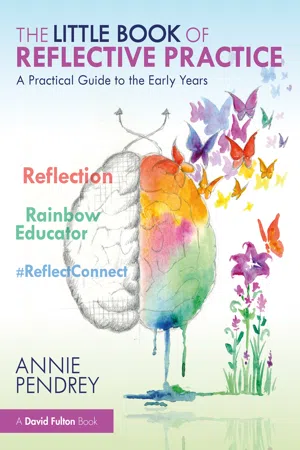
The Little Book of Reflective Practice
A Practical Guide to the Early Years
Annie Pendrey
- 140 Seiten
- English
- ePUB (handyfreundlich)
- Über iOS und Android verfügbar
The Little Book of Reflective Practice
A Practical Guide to the Early Years
Annie Pendrey
Über dieses Buch
The Little Book of Reflective Practice is bursting with big ideas which will encourage you to be curious, reflective and courageous in your professional learning journey. It introduces the key reflective theories alongside case studies from educators to show how these can be applied to improve practice.
The journey from being to thriving is set out in several chapters each providing different themes which will encourage you to capture your reflections, record your learning and development and apply theories of reflection to your professional practice. Full of practical guidance, activities and questions to prompt reflective thinking, the chapters cover:
-
- getting started
-
- how to write reflectively
-
- creating spaces to be reflective
-
- using reflective practice to set targets for your learning and professional development
Spaces for capturing your reflective thoughts and reflective activities are provided througout, alongside sections where you may wish to stop and engage in deeper thinking. This book will be invaluable reading for early years practitioners, tutors and early years students on level 3 courses and Foundation Degrees.
Häufig gestellte Fragen
Information
1 Being Me
Introduction
Let Us Start With Bungee Jumping
Theme 1a – Courage
- Emotional Courage – this is best described as ‘follow your heart’, display your emotions and despite possibly not feeling brave follow your heart in the decisions you make. In the case of the lion, despite being petrified of the Wicked Witch, Lion listened to his heart and whilst he felt emotions that were both positive and negative, he knew he had to rescue Dorothy. Reflective Thoughts
 Stop a while and consider a situation where you feel you may need to display emotional courage. Share with your peers or mentor if you wish or simply have a quiet reflective moment.Once you have done this, you may find you generate other reflective thoughts as you read more about the different types of courage. If so, pause and capture your reflective thoughts.
Stop a while and consider a situation where you feel you may need to display emotional courage. Share with your peers or mentor if you wish or simply have a quiet reflective moment.Once you have done this, you may find you generate other reflective thoughts as you read more about the different types of courage. If so, pause and capture your reflective thoughts. - Physical Courage – this is not something which when used causes harm but is the physical courage to persevere, to be self-aware and develop the resilience to pick yourself up and start again.
- Social Courage – this type of courage I believe to be both physical and emotional, the type of courage that asks you to be you and to display courage in the face of adversity. This is the type of courage I have always tried to instil in my learners, it is the social courage to send an email to organise their own vocational placement, to put their hand up in class and ‘have a go’ and to ask for help and guidance when needed.
- Moral Courage – we all have a set of morals we carry around with us and have you ever stopped to think how these form part of your moral courage? Moral courage could be described as the type of courage which involves being true to yourself but whilst following your morals, also displaying the moral courage to not only express your own opinions but to embrace the morals and opinions of others. Reflective Thoughts
 Stop and reflect upon what you consider to be your morals and how these are important to you in your professional journey.Can you think of a situation where you have displayed moral courage when working with others?What were the difficulties, and did you have to use any other types of courage in this situation?
Stop and reflect upon what you consider to be your morals and how these are important to you in your professional journey.Can you think of a situation where you have displayed moral courage when working with others?What were the difficulties, and did you have to use any other types of courage in this situation? - Intellectual Courage – if you have read this far in this book, I would suggest you have already displayed courage and now it is time to explore your intellectual courage. This type of courage is thought to be the courage we use when we are broadening our horizons, opening
our minds to new adventures, learning new concepts and later in the book theories of reflection which we can use as part of our intellectual courage as we begin to write our reflective accounts.

Final Reflection
Theme 1b – Be More...
Inhaltsverzeichnis
- Cover
- Half Title
- Title
- Copyright
- Contents
- Acknowledgements
- Preface: Falling Down a Rabbit Hole
- Introduction
- 1 Being Me
- 2 Spreading Your Wings: Reflective Writing
- 3 Ponder and Pause a While in the Gallery of Theorists
- 4 Belonging and Thriving
- References
- Adjectives to Support the Reflective Activities